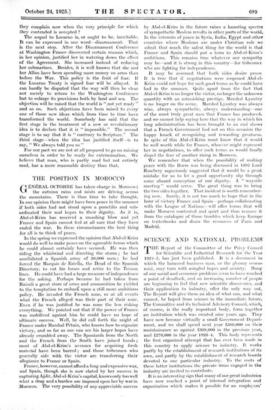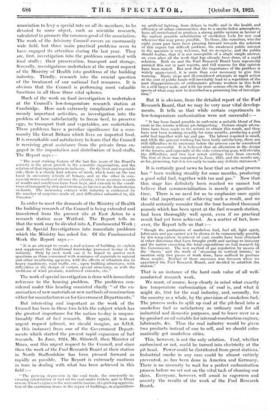SCIENCE AND NATIONAL PROBLEMS
THE Report of the Committee of the Privy Council for Scientific and Industrial Research for the Year 1924-5, has just been published. It is a document to which the harassed business man, or the gloomy econo- mist, may turn with mingled hopes and anxiety. Many of our social and economic problems s;sem to have reached a point of deadlock, and an increasing number of people are beginning to feel that new scientific discoveries, and their application to industry, offer the only way out. The Report will give them an idea of what can, and what cannot, be hoped from science in the immediate future. The Committee and its technical Advisory Council, which, of course, is the really important body, form together an institution which was created nine years ago. They have now become virtually a small Government Depart- ment, and we shall spend next year £380,000 on their maintainance as against £328,000 in the previous year, and £276,000 in the year 1923-4. This body represents the first organized attempt that has ever been made in this country to apply science to industry. It works partly by the establishment of research institutions of its own, and partly by the establishment of research boards devoted to one particular industry. To the costs of these latter institutions the private firms engaged in the industry are invited to contribute.
It is an interesting sign that many of our great industries have now reached a point of internal integration and organization which makes it possible for an employers' association to levy a special rate on all its members, to be devoted to some object, such as scientific research, calculated to promote the common good of the association. The work of the Advisory Council covers an enormously wide field, but three main practical problems seem to have engaged its attention during the last year. They arc, first, investigation into the problems connected with food stuffs ; their preservation, transport and storage. Secondly, investigations undertaken at the urgent request of the Ministry of Health into problems of the building industry. Thirdly, research into the crucial question of the treatment of our national fuel resources. It is obvious that the Council is performing most valuable functions in all these three vital spheres.
Much of the work on food investigation is undertaken at the Council's low-temperature research station at Cambridge. Here such extremely complicated yet enor- mously important activities, as investigation into the problem of how satisfactorily to freeze beef, to preserve eggs, to transport fruit and vegetables, are undertaken. These problems have a peculiar significance for a com- munity like Great Britain which lives on imported food. It is remarkable and satisfactory to learn that the Council is receiving great assistance from the private firms en- gaged in the importation and distribution of food-stuffs. The Report says :- " The most striking feature of the last five years of the Board's activity is the great growth in the scientific organization, and the relation of that organization to industry. On the fruit and vegetable side, there is a closely knit scheme of work, which rests on the -one hand in university schools of botany, and on the other in com- mercial stores scattered all over the country, where accurate records of results and conditions have been kept, and extends to the condi- tions of transport by ship and overseas, so far even as the Australasian orchards. The increasing contact with industry is evidenced by the number of enquiries made of, and difficulties submitted to, the Director."
In order to meet the demands of the Ministry of Health the building research of the Council is being extended and transferred from the present site at East Acton to a research station near Watford. The Report tells us that the work may be divided into A, Fundamental Work ; and B, Special Investigations into immediate problems which the Ministry has asked for. Of the Fundamental Work the Report says :- " It is an attempt to create a real science of building, to explain and supplement the traditional knowledge possessed to-day in the industry. Only by such work can it be hoped to answer such questions as those concerned with resistance of materials to natural and other weathering agencies, with the effects of vibration due to heavy machinery, road traffic, etc., upon building structures, with difficulties in the design of certain special structures, or with the problems of wind pressure, reinforced concrete, etc."
The work of special investigation is done with immediate reference to the housing problem. The problems con- sidered under this heading consisted chiefly " of the ex- amination of new materials or new methods of construction either for manufacturers or for Government Departments."
But interesting and important as the work of the Council has been in these two fields the subject which has the greatest importance for the nation to-day is unques- tionably that of fuel research. Here again, it was an urgent request (almost, we should imagine, an S.O.S. in this instance) from one of the Government Depart- ments which started the present rapid expansion of fuel research. In June, 1924, Mr. Shinwell, then Minister of Mines, sent this urgent request to the Council, and since then the work of the Fuel Research Board at their station in North Staffordshire has been pressed forward as rapidly as possible. The Report is extremely cautious in tone in dealing with what has been achieved in this field :— - - " The growing depression in the coal trade, the constantly in- creasing substitution of fuel oil for coal under boilers, and in Diesel or semi-Diesel engines in the mercantile marine, the growing apprecia- tion of the enormous losses in the repair of buildings, in expenditure on artificial lighting, from delays in traffic and in the health and efficiency of urban communities, due to a smoke-laden atmosphere, have all contributed to produce a strong public opinion in favour of the earliest possible substitution of smokeless fuels for raw coal wherever this may prove possible. To those, like ourselves, who for eight years past have been pressing forward towards the solution of this urgent but difficult problem, the awakened public interest in the question is very welcome, but we recognize, and the publio_ should realize, that it is not susceptible of a single simple answer, or, even after all the work that has already been done, of a rapicla solution. Both we and the Fuel Research Board have repeatedly pointed this out in past reports, and full reasons for this opinion have been stated. But now that the importance of the problem is widely appreciated, it is more than ever necessary to give this warning. Hasty steps and ill-considered attempts at rapid action at the cost of public funds will inevitably lead to a repetition of the past disappointments of enthusiastic private workers in this field on a still larger scale, and with far more serious effects on the pro- spects of what may now be described as a promising line of investiga- tion."
it is obvious, from the detailed report of the Fuel Research Board, that we may be very near vital develop- ments. It tells us that while certain experiments in low-temperature carbonization were not successful :— " It has been found possible to carbonize a suitable blend of fine coals in the retorts without pre-briquetting. Certain simple altera- tions have been made to the retorts to obtain this result, and they, have now been working steadily for some months, producing a good; solid fuel together with tar and gas. The labour required is small,; and while the general working has been fairly satisfactory, there are still difficulties to be overcome before the process can be considered; entirely successful. It is believed that an alteration in the design of the retorts, and especially of the coke extracting gear, will obviate, the difficulties, and two new retort settings have been erected: The first of these was completed in June, 1925, and the results are,) so far, promising, but it is too early to make any definite statement.", It is certainly good news to hear that an actual process, has " been working steadily for some months, producing' a good solid fuel, together with tar and gas." Now that this stage has definitely been reached we cannot but believe that commercialization is merely a question of time. There is no need for us to emphasize once again' the vital importance of achieving such a result, and we should certainly consider that the four hundred thousand' pounds which has been spent at the fuel research station,' had been thoroughly well spent, even if no practical result had yet been achieved. As a matter of fact, how- ever, the Report tells us that :— " though the production of smokeless fuel, fuel oil, light spirit,' lubricants and gas cannot yet be shown to be commercially possible by low-temperature treatment of coal, results have been obtained) in other directions that have brought profit and savings to industry and the nation exceeding the total expenditure on fuel research by, the Government. The new method of gas regulation by means of the ' therm ' and the work of ' steaming in vertical retorts,' to mention only two pieces of work done, have sufficed to produce these results. Neither of these successes was foreseen when we appointed the Fuel Research Roard, and decided to establish the station."
That is an instance of the hard cash value of all well- conducted research work.
We must, of course, keep clearly in mind what exactly, low temperature carbonizatign of coal is, and what it might do, first for the coal industry, and, secondly, for the country as a whole, by the provision of smokeless fuel..! The process seeks to split up coal at the pit-head into a, smokeless fuel as satisfactory as ordinary coal for all industrial and domestic purposes, and to leave over as a' by-product an oil suitable for internal-combustion engines,) lubricants, &c. Thus the coal industry would be given two products instead of one to sell, and we should auto- matically get smokeless cities.
This, however, is not the only solution. Coal, whether carbonized or not, could be turned into electricity at the' pit head. Power could be distributed from great stations.) Industrial smoke in any case could be almost entirely prevented, as has been done in America and Germany. There is no necessity to wait for a perfect carbonization process before we set out on the vital task of cleaning our skies. Everyone, however, will await in eagerness and anxiety the results of the work of the Fuel Research. Board.































































 Previous page
Previous page